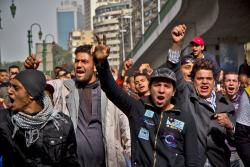Written by Walaa Quisay
Monday, 31 January 2011
After
a much criticised silence, Hosni Mubarak has finally made a statement
regarding the protests. The initial reaction to the speech was one of
anger. Mubarak’s speech was quite predictable, basically praising the
poor, promising reform and what not. Even though these blatant lies that
reek of condescension are enough reason to ignite the streets of Egypt
with fury, it was Mubarak’s last statement that angered the people the
most.
 31st January. Photo: Darkroom ProductionMubarak
31st January. Photo: Darkroom ProductionMubarak
stated that he would be calling for the resignation of the government
(i.e. the ministers). Of course the streets of Cairo have asked for
Ahmed Nazif’s (the Prime Minister) resignation before but these protests
did not concern themselves with ministers. The Egyptian streets are
calling for Mubarak’s resignation, not just Nazif’s or Habib’s! Workers
of the steel and mining industry have called a strike in solidarity with
the people. As the infamous NDP businessman (who monopolises the steel
industry), Ahmed Ezz, tried to escape the country he was arrested at the
airport.
There is something very threatening in the follow-up to Mubarak’s
statement, the appointment of Omar Suleiman to the vice-presidency. In
the past, Mubarak had refused to appoint a vice-president because ever
since the establishment of a republic the vice-president would inherit
leadership from the past president. Hosni Mubarak, himself, was the vice
president of Anwar El Sadat. In order to pass the power to his son,
Gamal Mubarak, Hosni Mubarak chose no vice-president. Who is Omar
Suleiman and why did Mubarak elect him?
Omar Suleiman is a strong and very politically ambitious military
man. He has held key positions in the army. During the Bush era, he was
favoured as Mubarak’s successor. Omar Suleiman has been the chief of
“Egyptian Intelligence” for almost 18 years. This means that he has been
a key figure in the rampant political repression, torture and crimes
against humanity committed by the Mubarak regime in the past 18 years.
He controls the secret police and runs the political prisons and
military apparatus. There is no question about the fact that he has been
on the CIA payroll for a very long time. Besides his domestic human
rights abuses, Omar Suleiman is also the active voice of Israel in the
Middle East. Officially, Omar Suleiman is the mediator in the
Israel-Palestine conflict, but of course there is much more to it than
that. In reality Omar Suleiman has been deeply involved, along with the
leader of the Palestinian authorities Mahmoud Abbas, in deals that cause
the people of Palestine great suffering. Omar Suleiman is without doubt
an unpopular figure in Egypt.
Why did Mubarak appoint him as vice-president? Mubarak is not a
conscious dictator, in the sense that he does not take the power of the
people seriously; rather he is quite threatened by Washington’s
condemnations. Mubarak still doesn’t get it. He believes that if he
places the CIA’s top man in the position that translates to succession,
they will take more actions to support him. This is a very tricky game.
The US has already declared “understanding” for the protest so it would
be harder for them to take any direct action. Mubarak does not need
finance at the moment or weapons; he needs people to agree to direct
these weapons at the people. The army and the police force are not
trusted by the regime. The appointment of Omar Suleiman is Mubarak’s cry
for help to the CIA and Israel.
Now, there is a chance that if Mubarak is toppled Omar Suleiman will
be the new president (according to the constitution). If he in fact he
does succeed in that, then that would mean plans for a massive clampdown
on dissenters and ordinary people; very strict military rule and this
would not translate well at all for the Palestinian people or anyone at
all. If he fails, then this would be good news for the Egyptian people
because the CIA will not be able to prop him up in the later democratic
stages of the revolution.
[This letter was sent on January 29, just after Mubarak had made his TV statement]
